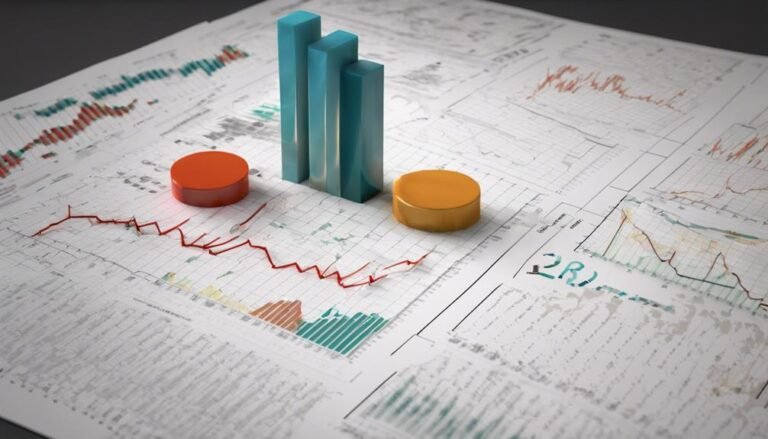Exchange Rates and Foreign Exchange Markets
Understanding exchange rates and foreign exchange markets is essential for global investors. Economic indicators, political stability, and market speculation all influence currency values. Central banks shape monetary policies impacting exchange rates. Various participants like commercial banks and hedge funds play significant roles in these markets. Currency hedging strategies help manage risks. Exchange rates affect trade balances and export competitiveness, impacting economic performance. Speculators leverage positions to profit from currency fluctuations. Analyzing future trends using economic indicators and technological advancements is key for forecasting. Dive deeper into exchange rates and foreign exchange markets for a thorough understanding of their impacts on the global economy.
Key Takeaways
- Exchange rates impact global investments and trade balance.
- Economic indicators, political stability, and market speculation influence rates.
- Central banks intervene to stabilize currency values.
- Different exchange rate regimes have unique advantages and challenges.
- Understanding currency hedging and its impact on trade is crucial.
Importance of Exchange Rates
Understanding the dynamics of exchange rates is essential for investors seeking to optimize their international investments. Currency fluctuations analysis and exchange rate forecasting play an important role in predicting market trends. By analyzing historical data and market indicators, investors can make informed decisions to maximize their returns. Global economic implications heavily rely on currency exchange dynamics. Fluctuations in exchange rates can impact a country's trade balance, inflation rates, and overall economic stability.
Accurate exchange rate forecasting is important for businesses engaged in international trade. It allows them to hedge against potential risks and uncertainties associated with currency fluctuations. Additionally, understanding the factors influencing exchange rates is imperative for making strategic investment decisions. By staying informed about geopolitical events, economic policies, and market trends, investors can anticipate currency movements and adjust their portfolios accordingly.
Factors Affecting Exchange Rates
When analyzing exchange rates, it's essential to take into account how economic indicators impact currency values.
The stability of a country's political environment also plays a significant role in influencing exchange rates.
Additionally, market speculation can have a notable effect on the fluctuation of currency values in foreign exchange markets.
Economic Indicators Impact
Economic indicators play an important role in influencing exchange rates in foreign exchange markets.
The implications of economic growth are significant, as countries with strong economic performance often see an appreciation in their currency value due to increased investor confidence and capital inflows. Conversely, countries experiencing economic downturns may face depreciation in their currency.
Global trade consequences are also closely tied to exchange rates, with stronger currencies making exports more expensive and imports cheaper, impacting a country's trade balance.
Inflation rates have a direct correlation with currency value fluctuations.
Higher inflation rates typically lead to currency depreciation as the purchasing power erodes. Central banks may respond to high inflation by increasing interest rates, which can attract foreign investment and strengthen the currency.
On the other hand, low inflation rates may lead to currency appreciation, as it signals economic stability and can attract investors seeking higher returns.
Understanding these economic indicators is important for investors and policymakers to navigate the complexities of foreign exchange markets.
Political Stability Influences
The stability of a country's political environment significantly influences exchange rates in foreign exchange markets, impacting investor confidence and capital flows.
- Investor Confidence: Political stability fosters a positive investment climate, attracting foreign investors and strengthening the country's currency.
- Capital Flows: Uncertainty in a nation's political landscape can lead to capital flight, causing a depreciation of the currency.
- Government Policies: Stable political environments often result in consistent economic policies, which can help maintain a stable exchange rate.
- Risk Perception: Political unrest or frequent changes in leadership can increase the perceived risk associated with investing in a country, leading to currency fluctuations.
Political stability is an essential factor in determining a country's exchange rate. Countries with stable governments tend to have stronger currencies due to higher investor confidence and steady capital inflows. Conversely, political instability can lead to fluctuating exchange rates as investors become wary of potential risks. Understanding the impact of political stability on currency fluctuations is vital for investors and policymakers alike to make informed decisions in the foreign exchange markets.
Market Speculation Affects
Market speculation plays a pivotal role in influencing exchange rates by reflecting investor sentiment and expectations in the foreign exchange markets. Market psychology and trading strategies heavily influence how traders perceive the value of currencies, leading to fluctuations in exchange rates. Understanding market psychology is essential for devising effective trading strategies and managing risks associated with market volatility.
| Factors | Impact on Exchange Rates |
|---|---|
| Market Psychology | Reflects investor sentiment and expectations, driving short-term fluctuations in exchange rates. |
| Trading Strategies | Influence trading decisions, affecting the demand for different currencies and impacting exchange rates. |
| Risk Management | Effective risk management strategies can mitigate the impact of market volatility on exchange rates. |
| Market Volatility | High volatility can lead to rapid and significant changes in exchange rates, making risk management essential. |
Types of Exchange Rate Regimes
Understanding the various types of exchange rate regimes is essential for grasping the dynamics of global currency markets. Different regimes can have a notable impact on a country's economy and trade relationships. Here are four key types to explore:
- Fixed vs. Floating: This fundamental classification distinguishes regimes based on the flexibility of exchange rates.
- Managed Float Systems: These regimes allow for some degree of market-driven fluctuation but with central bank interventions to influence the currency value.
- Pegged Currency Arrangements: Countries using this regime maintain a fixed exchange rate with a specific foreign currency or a basket of currencies.
- Currency Board Arrangements: In these regimes, domestic currency issuance is backed by a foreign reserve currency, ensuring a stable exchange rate.
Each regime comes with its advantages and challenges, impacting how exchange rates are determined and managed within the global economic landscape.
Role of Central Banks
Central banks play a pivotal role in shaping monetary policy and influencing economic stability. Through their interventions in the foreign exchange market, central banks seek to achieve various objectives such as controlling inflation, maintaining currency stability, and supporting economic growth. When central banks buy or sell foreign currencies in the market, it can impact the exchange rate of their domestic currency.
Central banks' interventions in the foreign exchange market can have significant monetary policy implications. For example, if a central bank wants to weaken its currency to boost exports, it may sell its domestic currency and buy foreign currencies. This action increases the supply of the domestic currency in the market, leading to a depreciation of the currency. On the other hand, if a central bank aims to strengthen its currency to combat inflation, it may buy its domestic currency, reducing its supply and causing an appreciation.
Foreign Exchange Market Participants
Given the essential role central banks play in shaping monetary policy within foreign exchange markets, it's important to analyze the various participants involved in these markets to understand their impact on exchange rate dynamics. Understanding market participants dynamics and regulatory implications is vital for comprehending the intricacies of foreign exchange markets.
- Commercial Banks: These institutions are key players in the foreign exchange market, facilitating transactions for clients and engaging in speculative trading.
- Hedge Funds: With their substantial capital, hedge funds can influence exchange rates through large trades, adding liquidity but also volatility to the market.
- Multinational Corporations: Companies involved in international trade are significant participants, managing currency risks and engaging in foreign exchange transactions to facilitate cross-border business.
- Retail Traders: Individuals trading currencies through online platforms have become a notable part of the market, contributing to liquidity and market efficiency.
Analyzing the behaviors and interactions of these participants is essential for understanding how exchange rates are determined and how regulatory measures can impact market stability.
Exchange Rate Determination
Exchange rates are determined by the interactions of various economic factors and market participants in the foreign exchange markets. Exchange rate fluctuations occur due to changes in supply and demand for different currencies. Market participants, including governments, central banks, financial institutions, and individual traders, play a significant role in influencing exchange rate movements through their trading activities and policy decisions.
Currency valuation models are used to assess the fair value of a currency relative to others. These models consider factors such as inflation rates, interest rates, trade balances, political stability, and market speculation. The two main approaches to currency valuation are the purchasing power parity (PPP) theory and the interest rate parity (IRP) theory. PPP theory suggests that exchange rates should adjust to equalize the prices of identical goods and services in different countries, while IRP theory posits that differences in interest rates between countries should lead to currency adjustments.
Currency Hedging Strategies
Implementing effective currency hedging strategies is essential for managing foreign exchange risk in global financial markets. To navigate the complexities of currency fluctuations, consider the following key strategies:
- Forward Contracts: These contracts allow you to lock in an exchange rate for a future transaction, providing certainty in volatile markets.
- Options Contracts: Options give you the right, but not the obligation, to exchange currencies at a predetermined rate. This flexibility can protect against unfavorable exchange rate movements.
- Currency Swaps: Swaps involve exchanging currencies with a partner for a set period. This can help manage long-term currency exposure more efficiently.
- Natural Hedging: Aligning revenues and expenses in the same currency can act as a natural hedge, reducing the need for external hedging instruments.
Impact of Exchange Rates on Trade
When considering the impact of exchange rates on trade, it's essential to analyze the effects on trade balances and export competitiveness. Exchange rate fluctuations can significantly influence a country's trade balance by affecting the prices of imports and exports.
Additionally, a favorable exchange rate can boost a nation's export competitiveness in global markets, leading to increased trade activity.
Trade Balance Effects
The influence of exchange rates on trade balance is an essential factor affecting a country's economic performance. When examining how exchange rates impact trade, several key points come to light:
- Trade Surplus Implications: A stronger domestic currency can lead to a decrease in exports as goods become more expensive for foreign buyers. This may result in a reduction in trade surplus, affecting overall economic stability.
- Import Costs Impact: A weaker currency can increase the cost of imports, impacting a nation's trade balance. Higher import costs may lead to inflationary pressures and affect the affordability of foreign goods.
- Competitiveness Challenges: Fluctuating exchange rates can create challenges for businesses in pricing their goods competitively in international markets. This can impact market share and overall trade volumes.
- Policy Considerations: Governments often intervene in foreign exchange markets to stabilize their currency and support trade balances. These interventions can have both short and long-term effects on trade dynamics.
Understanding these dynamics is important for policymakers and businesses to navigate the complexities of international trade in a globalized economy.
Export Competitiveness Influence
Exchange rates play a significant role in shaping a country's export competitiveness, directly impacting its trade performance. When a country's currency depreciates, its export pricing strategies become more competitive in international markets. This can lead to increased export sales as foreign buyers find products more affordable compared to competitors. Additionally, currency devaluation can also make imports more expensive, prompting domestic consumers to opt for locally produced goods, thereby boosting domestic industries.
In the domain of competition, a weaker currency can give a country an edge in export markets by lowering the prices of its goods and services. This can help companies gain market share and expand their customer base globally. However, it's essential for countries to carefully manage currency devaluation effects to avoid potential trade disputes with other nations.
Speculation in Foreign Exchange Markets
Engaging in speculation within foreign exchange markets involves forecasting currency price movements to profit from fluctuations. Speculators play an important role in these markets, aiming to capitalize on the constantly changing exchange rates.
Here are four key points to keep in mind when delving into speculation in foreign exchange markets:
- Leverage: Speculators often use leverage to amplify their positions in the market, potentially increasing both profits and losses.
- Market Sentiment: Understanding market sentiment is essential for speculators to predict currency price movements accurately.
- Technical Analysis: Utilizing technical analysis tools can assist speculators in identifying trends and patterns to make informed trading decisions.
- Global Events Impact: Speculators must stay informed about global events as they can have a significant impact on currency values, presenting both risks and opportunities.
Future Trends in Exchange Rates
Anticipating future trends in exchange rates requires a strategic analysis of global economic indicators and market dynamics. Exchange rate volatility analysis plays an important role in forecasting future exchange rate movements. By examining historical data and identifying patterns in exchange rate fluctuations, analysts can make informed predictions about potential currency value changes.
Technological advancements have greatly impacted exchange rate trends in recent years. The use of algorithmic trading and high-frequency trading algorithms has increased market efficiency and liquidity, leading to more rapid adjustments in exchange rates. Additionally, the rise of online trading platforms and digital payment systems has facilitated cross-border transactions, affecting currency valuations.
Globalization effects on exchange rates are also notable. As economies become more interconnected, factors such as trade flows, foreign direct investment, and geopolitical events can influence exchange rate movements. Understanding these global dynamics is essential for accurately forecasting future exchange rate trends and mitigating risks associated with currency fluctuations. By staying informed and utilizing advanced analytical tools, individuals and businesses can navigate the complexities of the foreign exchange market with greater confidence.
Conclusion
You may think exchange rates are just numbers on a screen, but they actually hold the power to make or break economies.
With factors like central bank interventions and market speculation at play, the foreign exchange market is a high-stakes game.
Understanding how exchange rates impact trade and implementing effective hedging strategies is vital for success in today's global economy.
Stay tuned for the ever-changing trends in exchange rates – they could make or break your financial future.








